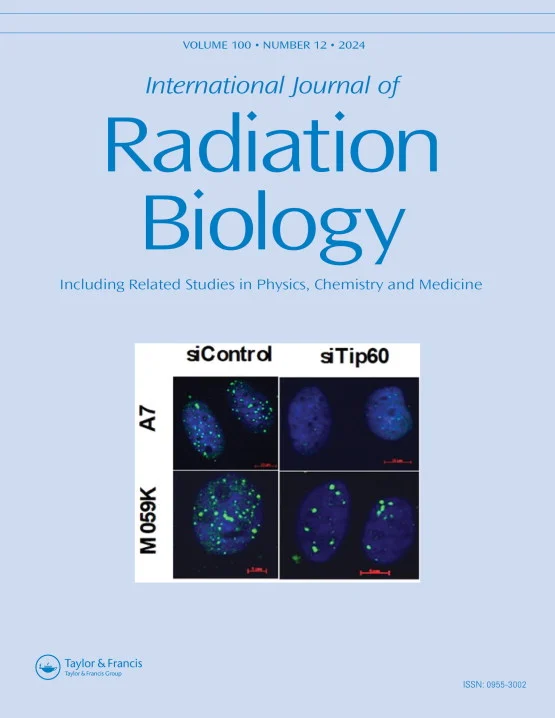两种大鼠模型(有甲状腺和无甲状腺)急性服用 131I 后的长期生物效应。
IF 2.4
4区 医学
Q2 BIOLOGY
引用次数: 0
摘要
目的放射性碘-131(RAI 或碘-131)是诊断和治疗甲状腺疾病最常用的放射性核素之一(占核医学所有疗法的 90%)。为了优化对患者的保护,必须评估 RAI 治疗对非靶器官的长期生物影响。在两种 Wistar 大鼠模型中施用 RAI:第一种是甲状腺完整的模型(Thy + 模型),第二种是甲状腺切除的模型(Thy- 模型)。在每个模型中,6 只大鼠口服 18.5 ± 1MBq [131I]NaI 溶液,另外 6 只作为对照组。这 24 只大鼠被单独关在笼子里 08 个月后被安乐死。通过心脏穿刺采集血液,并立即切除所有器官。结果组织学观察显示,甲状腺模型的肝脏病变更为严重,两种模型的肾脏组织都出现了影响(血色素沉积、纤维化和肾小球坏死),而睾丸切片没有任何异常。结论131I 给药的长期生物效应显示出现了各种组织学紊乱,肝脏和肾脏功能紊乱也证实了这一点。本文章由计算机程序翻译,如有差异,请以英文原文为准。
Long-term biological effects after acute 131I-administration of two rat models (with and without thyroid).
PURPOSE
Radioiodine-131 (RAI or iodine-131) is one of the most frequently used radionuclides for diagnosis and therapy of thyroid diseases (90% of all therapies in nuclear medicine). In order to optimize the patient protection, it is important to evaluate the long-term biological effects of RAI therapy on non-target organs.
MATERIALS AND METHODS
An experimental animal model has been adopted, it consists on miming RAI therapy. An activity of RAI has been administrated in two models of Wistar rats: the first model with an intact thyroid gland (Thy + model), and the second one was thyroidectomized (Thy- model). For each model, 6 rats were orally contaminated with a solution 18.5 ± 1MBq of [131I]NaI and 6 others rats were used as controls. The 24 rats have been placed in individual cages for a period of 08 months then they were euthanized. The blood was collected by cardiac puncture and all organs were immediately removed. A fraction of thyroid, liver, kidneys and testicles was put in vials containing formaldehyde (10%) for histological investigation.
RESULTS
Histological observations show some liver disorders more accentuated in the case of the Thy- model, the appearance of kidney tissue effects (hemosiderin deposits, fibrosis and glomerular necrosis) for both models and an absence of any anomaly for the testicles slides. The disturbance of blood parameters specific to each organ has been revealed.
CONCLUSIONS
Long-term biological effect of 131I-administration shows the appearance of various histological disorders confirmed by disturbances in hepatic and renal functions.
求助全文
通过发布文献求助,成功后即可免费获取论文全文。
去求助
来源期刊
CiteScore
5.00
自引率
11.50%
发文量
142
审稿时长
3 months
期刊介绍:
The International Journal of Radiation Biology publishes original papers, reviews, current topic articles, technical notes/reports, and meeting reports on the effects of ionizing, UV and visible radiation, accelerated particles, electromagnetic fields, ultrasound, heat and related modalities. The focus is on the biological effects of such radiations: from radiation chemistry to the spectrum of responses of living organisms and underlying mechanisms, including genetic abnormalities, repair phenomena, cell death, dose modifying agents and tissue responses. Application of basic studies to medical uses of radiation extends the coverage to practical problems such as physical and chemical adjuvants which improve the effectiveness of radiation in cancer therapy. Assessment of the hazards of low doses of radiation is also considered.

 求助内容:
求助内容: 应助结果提醒方式:
应助结果提醒方式:


